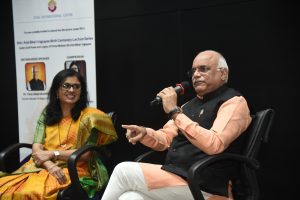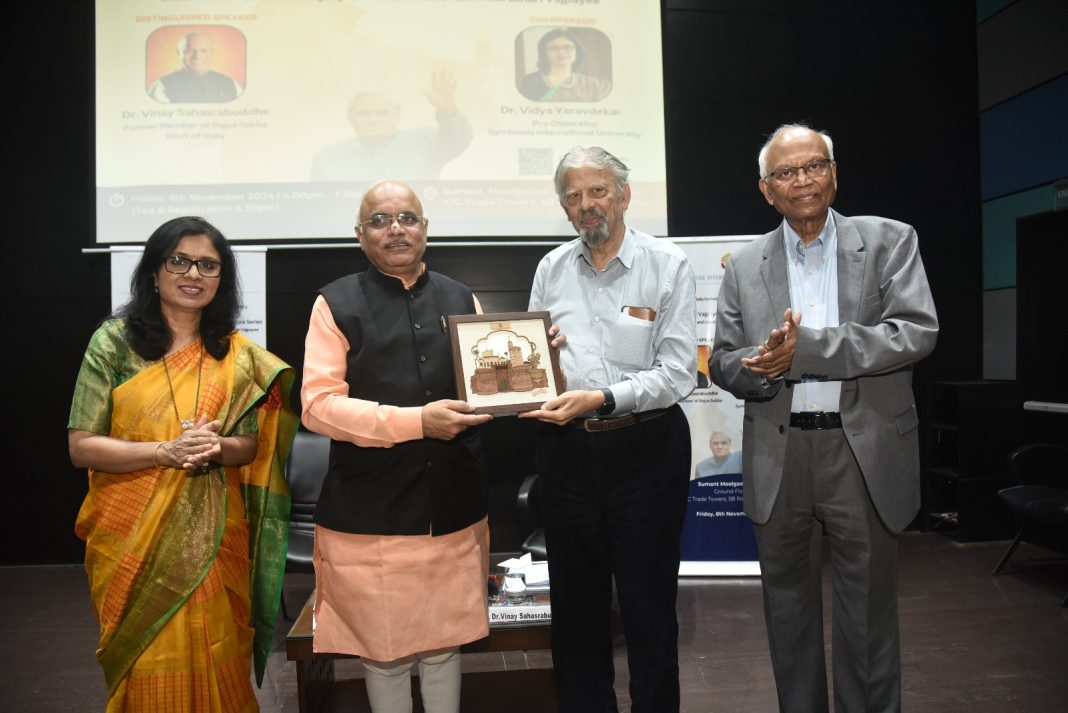A Tribute to Atal Bihari Vajpayee’s Soft Power Legacy
In Saturday’s event, the Shri Atal Bihari Vajpayee Birth Centenary Lecture Series focused on the lasting legacy of Vajpayee’s leadership. The lecture was titled “India’s Soft Power and Legacy of Shri Atal Bihari Vajpayee.” It explored how Vajpayee’s vision and leadership helped position India as a global leader. His contributions went beyond economic and military strength. They highlighted the power of culture, diplomacy, and values in shaping India’s global influence.
Dr. Vinay Sahasrabuddhe, a former Rajya Sabha MP, delivered the lecture on November 8. The event took place at the Sumant Moolgaokar Auditorium, ICC Trade Tower, Pune. He elaborated on how Vajpayee harnessed India’s rich culture. He also discussed how Vajpayee used democratic ideals to project the nation’s influence on the global stage. Dr. Vidya Yeravdekar, Pro Chancellor of Symbiosis International University, Pune, chaired the event. Dr. Sahasrabuddhe highlighted Vajpayee’s exceptional leadership qualities and his ability to merge India’s values with global diplomacy. In his opening remarks, Mr. Abhay Vaidya, Director of PIC, introduced the guest to the audience.

The Role of Secularism and Peace in Vajpayee’s Vision
A central theme of the lecture was Vajpayee’s unwavering commitment to secularism and peace. Dr. Sahasrabuddhe emphasized that Vajpayee’s view of secularism went beyond its role in the Constitution; for him, it was the very fabric of India’s civilization. He believed that India’s strength lay in its ability to embrace and respect all religions equally, not just tolerate them. This inclusive approach to religion resonated on the global stage, where India was seen as a model for peaceful coexistence among diverse faiths.
Vajpayee’s foreign policy was guided by the principle of “friendship with all, dominance over none,” reflecting India’s age-old belief in Vasudhaiva Kutumbakam, or “the world is one family.” His diplomacy was based on building bridges with neighboring countries and other global powers, emphasizing peaceful cooperation and mutual respect. He was a staunch advocate for good neighborliness, showing the world that India could play a vital role in fostering regional and global peace. Vajpayee’s vision for peace extended to his rejection of cross-border terrorism, firmly positioning India against violence disguised as religious justification.
Promoting Hindi and Celebrating the Indian Diaspora
Vajpayee made a significant contribution to India’s soft power by promoting Hindi and India’s cultural heritage globally. He recognized the power of language in shaping global perceptions. Vajpayee worked to spread Hindi internationally, stressing its importance as part of India’s identity. His efforts went beyond language promotion. They were part of a broader strategy to showcase India’s rich cultural heritage, including its literature, music, art, and traditions.
In addition, Vajpayee recognized the importance of the Indian diaspora in spreading India’s cultural and democratic values. He called the Indian community abroad “ambassadors of India” and initiated the Pravasi Bharatiya Divas (Non-Resident Indian Day) to celebrate their contributions. Therefore, this initiative aimed to strengthen the bond between India and its citizens around the world. In other words, it showcased the positive impact of the Indian diaspora in their respective countries. Above all, it demonstrated to the global community the valuable role played by the Indian diaspora in fostering international relations and cultural exchange.
By nurturing these connections, Vajpayee was able to project India as a global power not just through its economy or military might, but through its people and culture, strengthening its influence worldwide.
Environmental Conservation as an Extension of Soft Power
Vajpayee’s leadership was also marked by his deep concern for the environment, which became another significant element of India’s soft power. He emphasized that India’s relationship with nature should be one of harmony and balance, rather than exploitation. Vajpayee believed that environmental conservation was a key aspect of India’s global image and soft power. His policies led to the creation of buffer zones around national parks and wildlife sanctuaries, reflecting his commitment to preserving India’s biodiversity.
This approach to environmental conservation aligned with the broader Indian philosophical view of “confluence with nature,” rather than its conquest. By promoting India’s environmental efforts, Vajpayee showed the world that India was a responsible global player, concerned not only with economic growth but also with sustainable development. His environmental policies contributed to a positive perception of India, reinforcing its position as a nation committed to global welfare and conservation.
A Lasting Legacy
Dr. Sahasrabuddhe’s lecture provided an in-depth analysis of Atal Bihari Vajpayee’s multifaceted legacy. He emphasized how Vajpayee’s leadership helped shape India’s rise as a global soft power. Vajpayee promoted secularism, peace, cultural heritage, and environmental sustainability. His efforts laid the foundation for India’s image as a nation that is both powerful and rooted in values. These values promote peace, harmony, and mutual respect. His vision of a strong, peaceful, and culturally rich India continues to influence the country’s foreign policy and global role today.
Delivering the closing remarks, Dr. Raghunath Mashelkar, President of Pune International Centre (PIC), commended Dr. Sahasrabuddhe for his use of the term “soumya sampada,” describing it as a “beautiful expression” that captured the essence of India’s soft power. The lecture was followed by a lively Q&A session.





